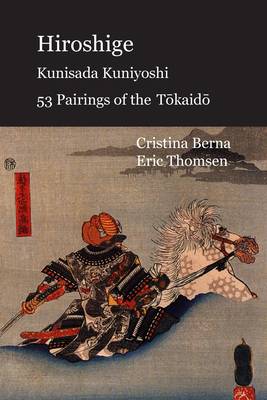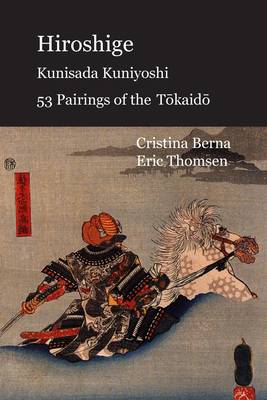
- Afhalen na 1 uur in een winkel met voorraad
- Gratis thuislevering in België vanaf € 30
- Ruim aanbod met 7 miljoen producten
- Afhalen na 1 uur in een winkel met voorraad
- Gratis thuislevering in België vanaf € 30
- Ruim aanbod met 7 miljoen producten
Hiroshige Kunisada Kuniyoshi 53 Pairings of the Tōkaidō
Cristina Berna, Eric ThomsenOmschrijving
The 53 Stations of the Tōkaidō by Utagawa Kunisada (1786 - 12 January 1865) is both a tour through the landscape of Japan and a cultural introduction.
But first of all it is a fashion magazine about beautiful, young and stylish Japanese women in 1838. These young beauties were one of the subjects Kunisada excelled in.
Kunisada show beautiful girls from all walks of life, explorers and adventurers, musicians, theater stars, imperial concubines, country girls, business women. They all have beauty and great fashion taste as the common denominator. His landscapes were a means of circumventing censorship especially of theater prints.
The work is probably one of the most romantic of all the Tōkaidō editions.
Utagawa Hiroshige
Utagawa Hiroshige (in Japanese: 歌川 広重), also called Andō Hiroshige (in Japanese: 安藤 広重;), was a Japanese ukiyo-e artist, considered the last great master of that tradition. He was born 1797 and died 12 October 1858.
Ukiyo-e is a genre of Japanese art which flourished from the 17th through 19th centuries. Its artists produced woodblock prints and paintings of such subjects as female beauties; kabuki actors and sumo wrestlers; scenes from history and folk tales; travel scenes and landscapes; flora and fauna; and erotica. The term ukiyo-e (浮世絵) translates as "picture[s] of the floating world".
Utagawa Kunisada (Japanese: 歌川 国貞; 1786 - 12 January 1865), also known as Utagawa Toyokuni III (三代 歌川 豊国 Sandai Utagawa Toyokuni), was the most popular, prolific and commercially successful designer of ukiyo-e woodblock prints in 19th-century Japan. In his own time, his reputation in Japan far exceeded that of his contemporaries, Hokusai, Hiroshige and Kuniyoshi. However, he is lesser known in the West.
At the end of the Edo period (1603-1867), Hiroshige, Kuniyoshi and Kunisada were the three best representatives of the Japanese color woodcut in Edo (capital city of Japan, now Tokyo). However, among European and American collectors of Japanese prints, beginning in the late 19th and early 20th century, all three of these artists were actually regarded as rather inferior to the greats of classical ukiyo-e, and therefore as having contributed considerably to the downfall of their art. For this reason, some referred to their works as "decadent".
Utagawa Kuniyoshi
Utagawa Kuniyoshi (歌川 國芳, January 1, 1798 - April 14, 1861) was one of the last great masters of the Japanese ukiyo-e style of woodblock prints and painting. He was a member of the Utagawa school.
The range of Kuniyoshi's subjects included many genres: landscapes, beautiful women, Kabuki actors, cats, and mythical animals. He is known for depictions of the battles of legendary samurai heroes.
Kuniyoshi was born on January 1, 1798, the son of a silk-dyer, Yanagiya Kichiyemon, originally named Yoshisaburō. Apparently he assisted his father's business as a pattern designer, and some have suggested that this experience influenced his rich use of color and textile patterns in prints. It is said that Kuniyoshi was impressed, at an early age of seven or eight, by ukiyo-e warrior prints,
Specificaties
Betrokkenen
- Auteur(s):
- Uitgeverij:
Inhoud
- Aantal bladzijden:
- 328
- Taal:
- Engels
Eigenschappen
- Productcode (EAN):
- 9781649454492
- Verschijningsdatum:
- 14/12/2020
- Uitvoering:
- Paperback
- Formaat:
- Trade paperback (VS)
- Afmetingen:
- 152 mm x 229 mm
- Gewicht:
- 439 g

Alleen bij Standaard Boekhandel
Beoordelingen
We publiceren alleen reviews die voldoen aan de voorwaarden voor reviews. Bekijk onze voorwaarden voor reviews.













